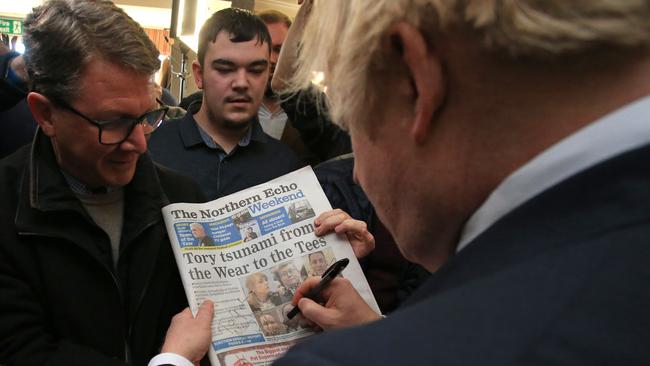
The full horror of a Boris Johnson landslide was beginning to dawn on Caroline Lucas as she sat down in front of a BBC microphone in the early hours of Friday.
Five more lonely years as Westminster’s only Green MP was just the start of her troubles. Worse, a popularly elected Prime Minister would have control of his own parliament.
Democracy was broken.
The election had been a bad idea, she said, which is why she had opposed going to the polls in the first place.
As social democrats become more socialist and less democratic, our relief at keeping their hands off the levers of state is even greater.
Dashing their hopes, as Johnson did last week, offers a window to peep into their souls. Their love for humanity is subsumed by their disgust at their fellow humans who, through malignancy or stupidity, voted for the wrong party.
Brexit is just the start of understanding last week’s earthquake in British politics.
It was the predictable excuse tendered by Labour MPs who dragged their weary feet into the BBC studio as the results came in, but the tectonic plates have been shifting since the prime ministership of Margaret Thatcher.
More than one hapless Labour MP drew comfort from the assumption that Labour voters were voting tactically. Once Boris had got Brexit done, they’d come back to the party that had put bread on the table of their beaten-down forefathers.
The chances of reconversion, however, are slim. An exit survey by Lord Ashcroft Polls showed fewer than one-in-five Conservative votes had been tactical, compared to a third of Labor votes.
There was little evidence of buyers’ remorse in Mansfield, a former Labour stronghold in the East Midlands that fell to the Conservatives at the last election with a swing of 18 per cent.
Last week Mansfield voters re-elected Conservative Ben Bradley with a further swing of 17 per cent, increasing his majority from barely 1000 to more than 16,000.
Welcome to the new Britain, a nation painted blue with some splashes of red and a big blotch of yellow at the top where the Scottish Labour Party used to be.
Welcome, too, to the new Conservative Party, the One Nation Conservative Party, as Boris Johnson brands it, that is looking more like the Liberal Party of Australia every day.
The British Conservatives were once regarded as a bastion of inherited privilege that ruled with a patrician hand, led by chaps who went to the right school and spoke with exaggerated vowels.
This is why Robert Menzies rejected the name Conservative for the party he formed in 1944, choosing Liberal instead.
It would be a party that would be “in no sense reactionary but believing in the individual, his rights, and his enterprise”.
It was a party, in other words, in the tradition of the 19th century Liberal prime minister William Gladstone. In order to serve free enterprise and prosperity, he wished to remove religious, economic, and political barriers that prevented individuals from pursuing their ambitions.
Margaret Thatcher, the shopkeeper’s daughter, also came from that tradition. The dynamism for the enterprise culture she sought to create came not from big business but the empowerment of the middle class.
It was under Thatcher that the Conservatives made political inroads into towns and suburbs where previously they had enjoyed little success.
Johnson, despite his privileged Home Counties background, is fiercely egalitarian, consciously and actively reaching out across the class divide.
“My mother taught me to believe strongly in the equal dignity, the equal worth of every human being on the planet. That may sound banal but it is not,” he told the Conservative Party Conference in October.
The task of his one nation conservative government was to unlock talent in every corner of the country, he said — “because that is the right thing to do in itself and because that is the way to release the economic potential of the whole country”.
The empowerment of the middle class is, as it has always been, an anti-Establishment cause that threatens the established privileges of the elite.
Today the bastions are the universities, which helps explain why the pockets of resistance to the Johnson landslide were, for the most part, university towns.
It explains why Labor comfortably held Birmingham Edgbaston, home to the city’s university, where there was a swing against the Conservatives of more than 2 per cent, but lost the neighbouring seat of Birmingham Northfield where there was a swing to the Conservatives of 3 per cent.
The university vote explains the swings against the Conservatives in normally safe seats like Bristol West, Cambridge, Warwick and Oxford East, little red islands in a sea of blue.
It explains, in part at least, why in Britain, as in Australia, age has become one of the strongest predictors of how people vote.
The Conservatives secured just 19 per cent of the 18-24 vote while 62 per cent went to Labour and the Greens, according to Lord Ashcroft Polls. In the over-65s the result was almost exactly the reverse, with 62 per cent going to the Conservatives and 20 per cent to Labour and the Greens.
Of Conservative voters, 40 per cent had been to university or had another professional qualification compared to 56 per cent of Labour voters. Conservative voters were twice as likely to be retired as Labour and almost twice at likely to be Christians.
The profile of the average Green and Scottish National Party voter is not dissimilar to Labour, helping to explain why the parties of the Left have fallen for Thunbergism and want the voting age lowered to 16.
The election message from all three parties was one of youth disempowerment and frustration, bordering on anger, at the perceived greed and environmental recklessness of their elders.
How they will respond to Johnson’s empowering message and his unabashed faith in capitalism is an open question upon which his country’s post-Brexit future depends.
Nick Cater is executive director of the Menzies Research Centre.



